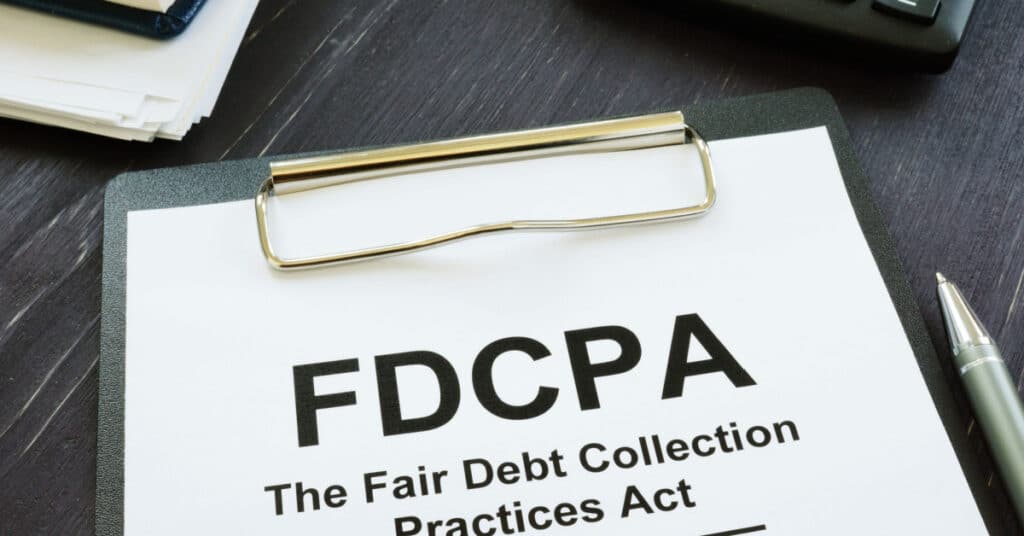If you’ve gotten too far behind on bills, debt collectors might start bugging you. And debt collectors generally are allowed to contact you about overdue debts. But there are a number of things they’re not allowed to do.
As a consumer, it’s important that you understand what debt collectors can and cannot do, and luckily, there’s a federal law that regulates their actions.
Table of Contents
What is the Fair Debt Collection Practices Act?
The Fair Debt Collection Practices Act is a federal law that lays out the rules about what third-party debt collectors can and cannot do when going after certain kinds of debt. The law “prohibits debt collection companies from using abusive, unfair or deceptive practices to collect debts from you,” according to the federal Consumer Financial Protection Bureau.
Some of the debts covered by this law are:
- Credit cards
- Mortgages
- Medical bills, which make up more than half of third-party debt collections
- Student loans
- Payday loans
- Auto loans
- Homeowners Association (HOA) dues
- Phone bills
- Utility bills
- Gym memberships
Under the law, debt collectors are defined as:
- Debt collection agencies or debt collection companies
- Debt buyers
- Law firms that collect debts as part of their business
Generally, the law does not include original creditors. An example of an original creditor is a credit card issuer that’s trying to collect past-due money for charges you made on one of the company’s credit cards.
It’s worth noting that the state where you live might have its own laws that regulate what debt collectors can and cannot do. For instance, some state laws might include original creditors in their definition of a debt collector.
To find out what the debt collection laws in your state are, visit the National Conference of State Legislatures website.
Are you eligible for debt relief?
We may be able to help. It’s easy and free to find out.
What debt collectors can do
One of the things debt collectors are supposed to do is provide certain information about the debt that it says you owe. This includes:
- The name of the creditor.
- The amount of money you owe.
- Your right to dispute the debt within 30 days. The dispute can be filed by either mail or email.
- Your right to request the name and address of the original creditor if this information isn’t the same as the information for the current creditor (such as a debt collection agency).
If the debt collector doesn’t give you this information when they first reach out to you, they must send you a written notice including that information within five days of their initial contact with you.
By the way, debt collectors are able to contact you:
- In person (but not at your workplace)
- By phone, mail, email, fax or telegram
- Via text message or social media
Remember that it’s likely a violation of the law if a debt collector calls you about a particular debt more than seven times within seven days or within seven days after talking with you by phone about a particular debt.
What debt collectors can’t do
Typically, debt collectors aren’t supposed to contact you at an unusual or inconvenient time or place. They can’t contact you before 8 a.m. or after 9 p.m. And they’re not allowed to contact you at work if you’re not permitted to receive this kind of communication when you’re at work.
In addition:
- A debt collector isn’t allowed to harass you over the phone or through any other type of communication.
- If a debt collector is aware that an attorney is representing you about the debt, the debt collector generally must stop contacting you and must reach out to your attorney instead.
- A debt collector must stop contacting you if you ask in writing that they cut off all communication with you. Telling a debt collector to stop contacting you doesn’t keep them from pursuing other methods to collect debt you owe, such as filing a lawsuit.
Furthermore, debt collectors aren’t allowed to lie to you or deceive you. Some of the things they can’t do are:
- Misrepresent themselves as attorneys or government representatives
- Communicate about your debt with third parties, such as your employer, neighbors and family members
- State that you’ve committed a crime by failing to pay a debt
- Inform you that they run or work for a credit bureau (like Equifax, Experian or TransUnion)
- Threaten to have you arrested or sent to prison if you don’t pay the debt
- Threaten to seize your wages, bank account or property unless that’s allowed by law and they plan to take this type of action
- Tell you that documents you’ve been sent are legal documents when they’re actually not
- Lie about how much you owe or what the status of the debt is
- Give you a company name for the debt collector other than the actual name of the debt collector’s company
Harassment from debt collectors
Harassment by a debt collector comes in many forms, such as:
- Repeated phone calls designed to annoy, abuse or harass you or anyone answering the phone
- Use of obscene or profane language
- Threats of violence or harm
- Failure to identify who they are when they call
“Do not let debt collection harassment force you into wrong decisions. Make your own choices about which debts to pay first based on what is best for you.”
The National Conference of State Legislatures
The legislative group notes that most people are unable to pay past-due bills due to job loss, illness, divorce or another major event.
“Creditors and collectors know this. The debt collector’s job is to try to convince you to pay their debt first. Your job, however, is to make the right choices for you and your family,” the group says.
READ MORE How to deal with debt collectors when you can’t pay
Common FDCPA violations
- For payday loan debt communication tactics, specifically, as of Sept. 13, 2022, the most common violation is frequent or repeated calls. Here is the breakdown:
- Frequent or repeated calls: 48.75%
- You told them to stop contacting you, but they keep trying: 31.27%
- Used obscene, profane or other abusive language: 16.30%
- Called before 8 a.m. or after 9 p.m.: 3.68%
Have your rights been violated? Here’s how to take action
So, what if you think a debt collector has lied to, misled or harassed you? Here are three of the steps you can take:
- File a complaint with the Consumer Financial Protection Bureau online or by calling 855-411-2372.
- Contact the Federal Trade Commission or the attorney general’s office in your state.
- Sue a debt collector in a state or federal court within one year of the date when you believe the Federal Debt Collection Practices Act was violated.
Keep in mind that even when a debt collector has violated federal law, your debt won’t disappear if you actually owe it.
In 2021, the Consumer Financial Protection Bureau received about 121,700 debt collection complaints. The bureau forwarded 60% of those complaints to debt collectors for their response. The biggest bunch of complaints were from consumers claiming that they didn’t owe the debt being collected.
Are debt collectors harassing you over payday loan debt?
DebtHammer may be able to help.
The bottom line
Even if you can’t afford to repay a debt, you have rights and debt collectors must follow the rules established by federal law. If you believe a debt collector has violated the FDCPA, don’t hesitate to contact the FTC, CFPB or your state’s attorney general to report the transgression.


